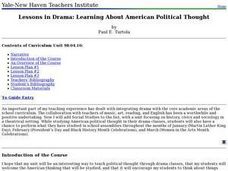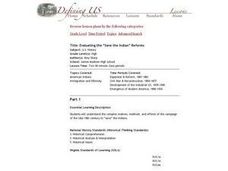Curated OER
The Eiserloh Story
Learners read "The Eiserloh Story" and evaluate decisions made by the government in time of war. They determine if the government violated the rights of innocent civilians. They identify the Bill of Rights and analyze each Right.
Curated OER
Have Minorities Gained Acceptance
Pupils cite evidence gathered from magazines about how much Blacks are accepted into the mainstream of American life. They support their conclusions by writing an answer to an essay question.
Curated OER
Trails to the West
Eighth graders research American history of the 1850's. In this American history instructional activity, 8th graders write about how different American groups looked at the idea of Manifest Destiny. Students then draw the Oregon and...
Curated OER
Jackie Steals Home
Students draw on their previous studies of American history and culture as they analyze primary sources from Jackie Robinson and Other Baseball Highlights, 1860s - 1960s in American Memory. A close reading of two documents relating to...
Curated OER
Reparations for Slavery
Students analyze slavery reparations. In this American history instructional activity, students examine the pros and cons of paying reparations for slavery and participate in a discussion.
Stanford University
Expansion of the Inca Empire
If you could write your own history textbook, what would you include? Learners play the role of textbook writers by examining evidence of the Inca Empire. With primary sources from Spanish and indigenous perspectives, as well as images,...
Curated OER
Lessons in Drama: Learning About American Political Thought
Students develop critical thinking skills so that they may produce their own written plays or music from their thoughts and feelings. They express their thoughts based on what has been presented to them over the duration of the course.
Curated OER
Abraham Lincoln and the U.S. Constitution
Students investigate President Abraham Lincoln's use of the U.S. Constitution and its importance to the Civil War. In this US history lesson, students read text about President Lincoln and the US Constitution. Students examine the...
Curated OER
Whose Side Are You On?
Students role play, persuading and staying neutral during arguments. In this viewpoint lesson, students examine the viewpoints of soldiers in the Spanish-American War and role play. After a discussion, some students try to persuade the...
Curated OER
Progression of Political Movements
High schoolers examine the various political parties throughout history. In groups, they are given documents identifying the platforms of the parties in the 1868 election. To end the lesson, they share their information with the class...
Foreign Policy Research Institute
Understanding the Koreas
Though this resource was designed in 2005, US tension with North Korea remains a relevant topic for exploration and understanding. Unfortunately, this lecture and reading-based instructional activity is unlikely to engage the class. The...
Curated OER
The Homestead Act
Eighth graders analyze the Native American's viewpoint of the Homestead Act. Using one Native American group who lived in Nebraska, they write a letter to the editor of a local newspaper discussing the Homestead Act and how it affected...
Curated OER
Rosa Parks/Segregation
Learners examine the role of Rosa Parks in ended segregtation in the South. Using new vocabulary, they observe the effects of segregation by being placed into different groups over a two day period. They discuss the feelings and emotions...
Curated OER
Lincoln, the Great Emancipator?
Students examine the motivating factors that prompted Lincoln to draft the Emancipation Proclamation in 1863. They examine Lincoln's social and political beliefs, particularly as they pertained to slavery and race in the United States.
PBS
The Sixties: Dylan Plugs in and Sells Out
Before Woodstock, there was Newport. Get plugged in to the social changes of the 1960s with a activity that looks at Bob Dylan's performance at the 1965 Newport Folk Festival as a symbol of the radical changes that marked the era.
Curated OER
Slave Narratives
Young scholars use a database to find and read examples of slave narratives. In groups, they read the various narratives and discuss their feelings about them. They also research the time period in which the narratives were written to...
Curated OER
Evaluating the "Save the Indian" Reforms
Students explore the policies of the "Save the Indian" reforms. Working in groups, they review the motives, methods, and effects of the "Save the Indian" campaign of the late 19th century. Through discussion and writing, they form an...
Curated OER
Unsung Military Heroes
In this lesson, pupils are introduced to the contributions made by African-American soldiers that have been excluded from traditional textbooks. To gain an appreciation for these unsung heroes, students engage in research to ultimately...
Curated OER
Segregated America
Students investigate Jim Crow laws. In this segregation instructional activity, students analyze images that display American segregation. Students use the provided questions to aid them in their evaluation of the images.
Curated OER
Myths of the Wild West
Learners examine the Wild West as it was depicted in films and books. In groups, they compare this information to what it was really like as they find out in books. They also discover the role of the Native Americans in the Wild West...
Curated OER
Women’s History
Students examine the "Cult of Domesticity." In this women's history lesson, students visit the specified Web sites to engage in research related to the characteristics that were thought to represent true womanhood as well as information...
Curated OER
The Slave Market: Slavery, Not Just a Southern Institution
Eleventh graders examine how slavery was related to the economic development of New York. In this American History lesson, 11th graders analyze the primary and secondary sources on the New York Slave Market. Students create a...
Curated OER
Attitudes Toward Emancipation
Students evaluate the provisions of the Emancipation Proclamation. They trace the stages that led to Lincoln's formulation of this policy. Explore the range of contemporary public opinion on the issue of emancipation.
Curated OER
Frederick Douglas and Abraham Lincoln
Students discuss the significance of the announcement of the Emancipation Proclamation and the assassination of Lincoln. They analyze how historians use evidence and develop differing interpretations. Students examine historical bias and...

























